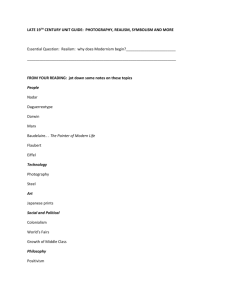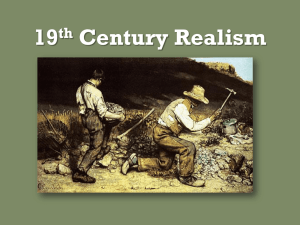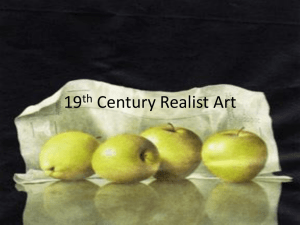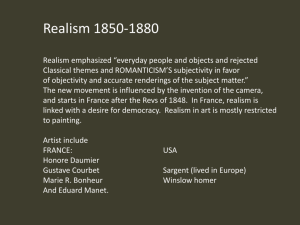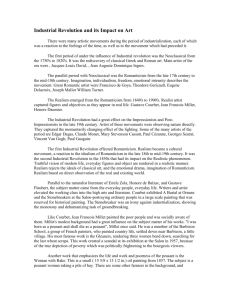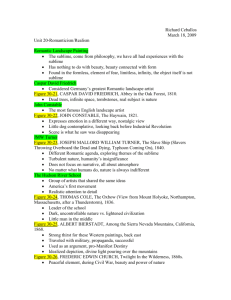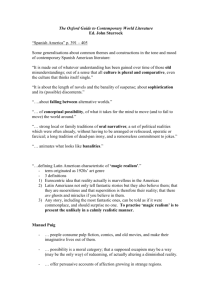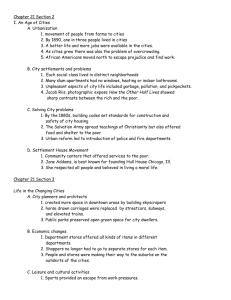PowerPoint on Realism in Art
advertisement
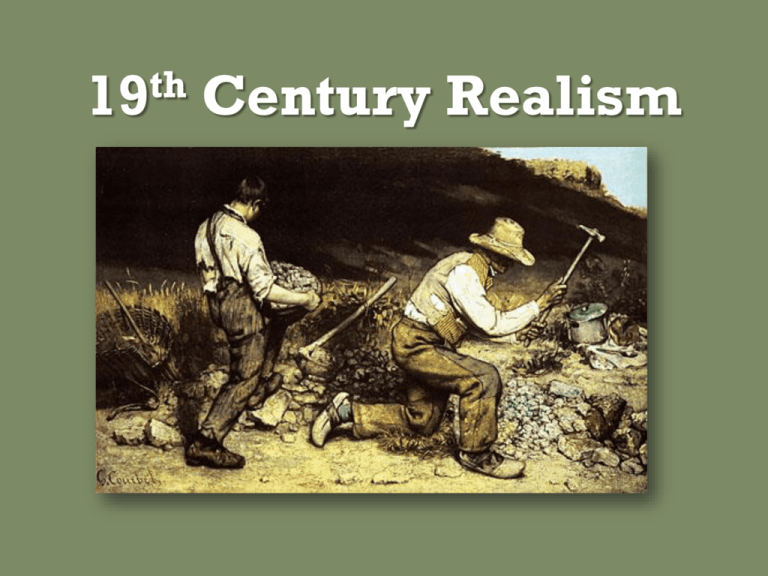
th 19 Century Realism The world is shrinking… • • • • • Telegraph Telephone Locomotive Automobile Photography…… • Literature focused on human nature and social consciousness. – Charles Dickens: Stories on poverty and factory life. – Karl Marx: Communist Manifesto, “From each according to his ability, to each according to his needs.” – Charles Darwin: Origin of Species, evolution. • Urban areas explode with people seeking work. • Human rights come into question with the way factory bosses treat workers with long hours, poor work conditions, and low pay. This leads to intense class struggles. Function of Realism • The function of Realism movement in art was direct observation of society and nature, and political and social satire. Due to society’s many economic changes, art also saw numerous changes: Museums and collectors became the new patrons. Newspapers and journals reached wider audiences • It was rejected for exhibitionism • Longest title of a major artwork. • He rented his own space and became the first one man show. 2 spheres: left= ordinary people right=the Paris art world – The nude symbolizes his turning his back on the Parisian art world. REALISM John Constable, The Hay Wain, 1821 In 1824 the Salon de Paris exhibited works of John Constable. His rural scenes influenced some of the younger artists of the time, moving them to abandon formalism and to draw inspiration directly from nature. REALISM Millet, The Gleaners, 1857 Natural scenes became the subjects of their paintings rather than mere backdrops to dramatic events. Jean-Francois Millet • Romanticism in that it shows “oneness with nature” • Realism kicks in with the contrast between the peasants hard, painful work in the foreground, and the comfort of their boss in the rich farm in the background. • Light vs. dark: The farm is gold and sunny, whereas the peasants are in shadows. French Realism • Jean-Francois Millet- Barbizon school • The Gleaners- 1848, his most famous work French Realism • The Gleaners was a controversial work criticizing a French society that allowed extreme poverty • Millet claimed that this was not a social comment but rather a celebration of hardworking peasants and their lifestyle. REALISM He extended the idea from landscape to figures —scenes of peasant life, and work in the fields. There is no drama and no story told, merely three peasant women in a field. This was totally new Millet, The Gleaners, 1857 Jean-François Millet, The Angelus, 1857. Realism. Symbolizes hard work The short hoe causes the man to have to bend over. The hard rocky ground makes him put in extra effort to till the soil, as seen in his expression (exhaustion). Millet Man With A Hoe, 1860. Oil on canvas Gustave Courbet,1819-1877 known as “the Apostle of Ugliness” He once said “ show me an angel and I will paint one” Gustave Courbet • His paintings shocked people- somewhat disturbing. • He was the foremost proponent of Realism. • His subject matter was landscapes, nudes, and still lifes. • Tried to incorporate all three of these into one painting if possible. Stone Breakers, 1850 The turned heads and averted eyes does not let the viewer feel sympathy towards the two figures. Interior of My Studio: A Real Allegory Summing Up Seven Years of My Life as an Artist. By Courbet Aka: The Artist’s Studio, 1855 He struggled to break from the Romanticism and move onto Realism. His ‘friends’ are workers and collectors on the right. Courbet sits at center like a king. Behind him is his muse, a nude female. Aka: The Artist’s Studio, 1855 When this was rejected by an 1855 exhibition, Courbet held his own exhibition. Although not very successful, it was the first one-man art show in history. Courbet, Burial at Ornans, 1850 Depicts a funeral. The monotonous horizontal colors and patterns reflect rural life in France. It’s also believed the sameness of the figures is a statement in favor of equality. Honore Daumier, 1808-1878 • • • • Both a Romantic and a Realist Primarily a caricaturist Father of modern caricature He is best known for his lithographs • He was censored and imprisoned for some of his works. Honore Daumier, 1808-1878 Gargantua Honore Daumier, 1808-1878 Gargantua A never satisfied king exploits his subjects and grows fat at their expense Daumier was sentenced to six months and fined 100 francs. Daumier, The Third Class Carriage, 1862 The Third Class Carriage • Lonely crowd • Genre scene • The shabby clothing and worn expressions shows that the passengers are lower class American Realism • Thomas Eakins -1844-1916 • Most important 19th century American painter • A passion for Realism lead him to use photography • He revolutionized art instruction and allowed women and minorities to be involved artistically. Eakins, The Gross Clinic, 1875 Operation on a young boy’s broken leg. It was too shocking to display to the public. Two contrasting behaviors: calm Dr. Gross and the scared and nervous mother. Eakins, The Agnew Clinic, 1889 It was called a degradation of art He became known as a butcher of art Subject is a woman being operated on for breast cancer. His lighting and shading techniques are said to resemble Rembrandt Eakins, The Agnew Clinic, 1889 Eakins, John Biglen in a Single Skull, 1873 Watercolor Out door, bright sunlight muscular tension Eakins had an intense interest in sports Eakins used photography to aid in his realism Henry O. Tanner, 1854-1937 • First important black American painter • His subjects were plantation scenes, and religious subjects • Studied in Paris for a short time • First black painter to become internationally famous Henry O. Tanner, The Banjo Lesson, 1893 his masterpiece influenced by Thomas Eakins Grandfather showing the grandson how to play the banjo Shows male bonding and family interaction Tanner, The Annunciation, 1898 French Realism • Most famous artist was Edouard Manet • Combined Realism and Impressionism Manet • He was classically trained and took his themes from the great masters • He was excellent at translating great traditions into modern terms which outraged the public Monet Velsaquez Manet • His style: solidity, flatness, modern elements: color, light, shape • Shallow perspective Manet. Luncheon on the Grass, 1863 Manet, Luncheon on the Grass, 1863 • Scandalized the French public. • Depicts a nude woman casually having lunch with two men. • This shocked people, but Manet claimed it was a statement of individual freedom. Manet, Luncheon on the Grass, 1863 • Failed to idealize the nude. • The public would recognize the men as his brother and brother-in-law. Manet, Luncheon on the Grass Titan, Pastoral Concert, 1510 Manet, Olympia 1865 • She is thought to be a French prostitute • The flowers were sent by a client. • Her shoes are still on which symbolizes street walking. • Small black cat- cathouse , alley cat Olympia Naked, not nude. Unclassical proportions. Boldly stares out at the viewer. Courbet felt the work was too flat looking Manet, Olympia 1865 • Inspired by Titian’s Venus of Urbino • The woman is naked rather than nude • Salon- an officially sponsored exhibition of juried art works that were acceptable to the French Academy. • As the art world evolved, a huge amount of works were being rejected from the Salon (4,000 in 1863). • This set off a fire storm of French artists. The result was a special exhibition called the “Salon des Refuses” Photography IS IT ART? • people argued that the mechanical technology made it automatic, not an artistic process. • Photography was allied with industry and science • 1859- French Photographic society negotiated an exhibition at the same time, and in the same building, as the Salon. Photography • Means “drawing with light” • A new method of creating multiple images • Potential for use in portraiture and journalism was widely recognized Nadar (French) • Used a plain dark background to put emphasis on his sitter. • Subtle gradations of light and dark • Sarah Bernhardt, 1864 Nadar (French) • He was a pioneer of aerial photography • 1856- took pictures from a balloon demonstrating potential of photography for creating panoramic vistas • He built his own balloon, “the Giant”, the largest in the world Le Geant , Honore Daumier England: Julia Margaret Cameron • Insisted on the aesthetic quality of her work. • She preferred blurred edges and a dreamy atmosphere to precise outlines. • Softness of face and collar, which emerge gradually from the darkness, seem literally “painted with light.” Mrs. Herbert Duckworth England: Julia Margaret Cameron • …a means to elicit the inner character of a sitter. J.F.W Herschel America Matthew Brady Lincoln, Cooper Union 1860 • Brady depicts the president as a thoughtful, determined man America Matthew Brady Robert E. Lee, 1865 • The confederate general is depicted, still standing at the end of the war. • His neat attire is shown to betray the years of suffering he has witnessed Realism Architecture Joseph Paxton Crystal Palace, London • 1851, the “Great Exhibition of the Works of Industry of all Nations” • First of, World’s Fairs • Artists were invited to submit designs for a building in Hyde Park to house the exhibition. • The structure was cheap, time-efficient, and because of the extensive use of glass, it was dubbed Crystal Palace. The Brooklyn Bridge The Brooklyn Bridge • Built by the greatest American bridge builders: J.A. and W.A. Roebling • Two towers of granite linked by four huge steel cables. • It is a suspension bridge meant for deep or wide water crossings The Statue of Liberty • Edouard de Laboulaye wanted to present the US with a monument to commemorate French assistance during the American Revolution • The named was changed from “Liberty Enlightening the World” to The Statue of Liberty • It is a colossal statue of a classically clothed woman holding a torch of liberty and a tablet. • It was sculpted by Auguste Bartoldi who used huge copper sheets. The frame was made of steel and wrought iron by Alexandre Gustave Eiffel The Statue of Liberty Eiffel Tower • Constructed by Alexandre-Gustave Eiffel. • Built initially as a temporary structure for the Universal Exposition of 1889. Public fought to have it taken down. It eventually stayed. • It has a metal truss construction on the base of reinforced concrete. • Four arches make up base. • All open lattice wrought iron. • Elevators bring people to the top and they are curved. Eiffel Tower
